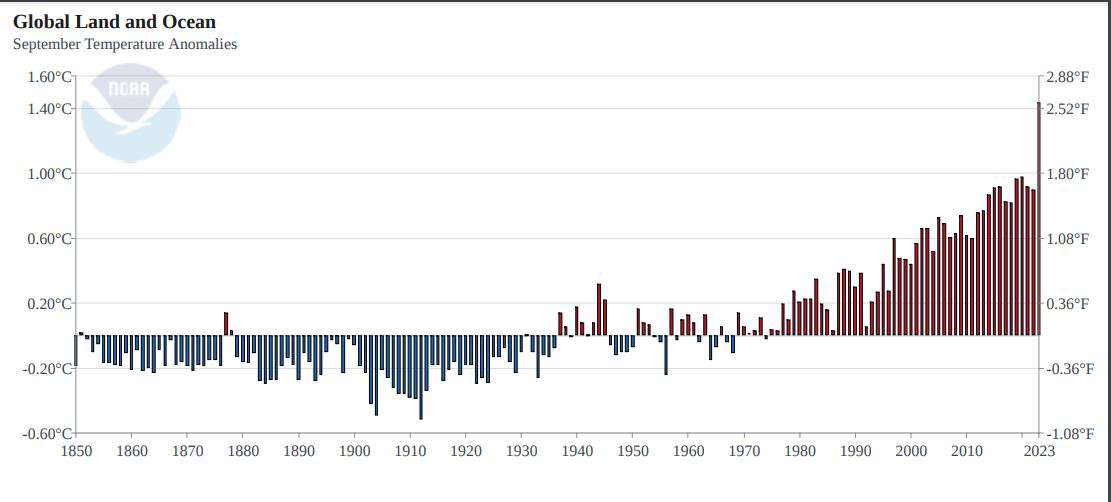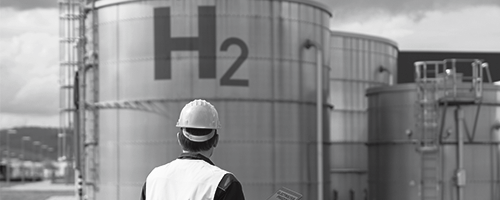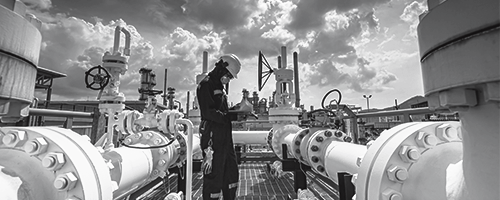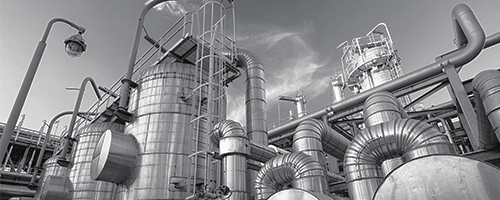
Key Issues at COP28: Tackling Climate Change
As the UN climate summit COP28 continues, countries worldwide are entering tough negotiations on pressing environmental issues. After a year of unprecedented heat and drought, highlighted by the hottest September in recorded history (see Fig.1), finding common ground to tackle climate change has become more crucial than ever. In this blog we review the key points of discussion to be addressed at COP28 in Dubai (Nov 30 – Dec 12th) and how Pall is aligned to help meet the challenges.
Figure 1: September 2023 temperatures rose high above the 20th-century average. Image: Climate Gov/NOAA (www.weforum.org)
Taking Stock of Climate Progress
As part of the Paris Agreement, participating nations will conduct a first-ever assessment of their progress toward limiting global temperature rise to "well below" 2 degrees Celsius and pursuing efforts to limit it to 1.5 degrees Celsius. Countries will engage in a "global stocktake" to devise a plan for meeting climate goals, potentially involving urgent CO2 emission reductions or increased investment in green technology.
The Future of Fossil Fuels
While countries have agreed to phase down coal usage, a consensus on the complete abandonment of all fossil fuels, which are major contributors to greenhouse gas emissions, has not been reached.
The United States, European Union, and climate-vulnerable countries advocate for a COP28 deal that commits nations to phasing out fossil fuels. However, this proposal faced opposition during the G20 summit in July, and oil-rich countries like Russia affirmed their dissent. The COP28 President Sultan al-Jaber of the UAE, has conveyed that the phase-down of fossil fuels is "inevitable."
Technologies to Tackle Emissions
Countries heavily reliant on fossil fuel-based economies aim to focus on emerging technologies that capture and store CO2 emissions underground. While the EU and others express concern that promoting such technologies may perpetuate fossil fuel usage, are expensive and currently lack large-scale adoption, they remain essential to solving the immediate global climate crisis.
Boosting Clean Energy Capacity
Proposals made by the EU, US, and the UAE's COP28 presidency seek to set goals for tripling renewable energy capacity and doubling energy savings by 2030. The renewables goal has gained support from major economies, including China. However, the EU and climate-vulnerable countries insist on linking this pledge with the phase-out of fossil fuels, leading to potential clashes.
"COP 28 is an opportunity to identify global solutions for limiting global temperature rise to 1.5 degrees, inform countries’ preparations for revised and more ambitious Nationally Determined Contributions (national climate plans) due by 2025, accelerate the green transition that is already happening and ultimately achieve the delivery of the Paris Agreement goals."
Financing for the Costs of Climate Change
Addressing climate change and its consequences requires significant investment. Developing countries will need a minimum of $200 billion annually by 2030 to adapt to worsening climate impacts and transition to clean energy sources. Additionally, setting up a "loss and damage" fund is crucial to aid countries in dealing with the already occurring climate disasters. More vulnerable developing nations are calling for at least $100 billion to be unlocked by wealthier countries, historically responsible for high emissions, to shoulder the financial burden.
'Side Deals'
Beyond the official UN negotiations, governments and companies are expected to announce their initiatives. Host country, the UAE for example, plans to launch a voluntary pledge from oil and gas companies to reduce emissions. Other side deals to be announced include commitments to limit emissions of methane, reduce air conditioning emissions, and restrict private financing for coal plants.
So, when the conference closes and whatever the outcomes, what can companies like Pall do to support the objectives of the COP28.
Green Technologies: Pall Corporation is actively investing in and developing enabling technologies that help realize scalable and affordable renewable energy solutions that reduce greenhouse gas emissions, improve energy efficiency, and promote sustainable practices. This includes innovations in fluid, gases and air filtration systems, plastics recycling, and carbon capture process solutions. For more information visit our Energy Transitions website.
Collaboration and Partnerships: Pall actively collaborates with organizations and industries to foster sustainable practices and share knowledge and expertise for mitigating climate change.
Carbon Footprint Reduction: Pall Corporation continues to reduce its carbon footprint by implementing energy-efficient measures, transitioning to renewable energy sources, and adopting sustainable manufacturing processes. This commitment extends throughout the company's operations, supply chain, and product life cycles.
Reporting and Transparency: Pall Corporation voluntarily discloses its environmental impact and progress towards climate goals through transparent reporting. Pall also supports the United Nations Sustainable Development Goals (UN SDGs) under the United Nations 2030 Agenda for Sustainable Development. Download our Sustainability Report here.
By aligning our business strategies with sustainable development, Pall is fully committed to transitioning to a low-carbon future and enabling itself and others to preserve the health of our planet.
For more information on how Pall Corporation supports the transition to green energy, visit here.
- Category
- Author
- Sort By












